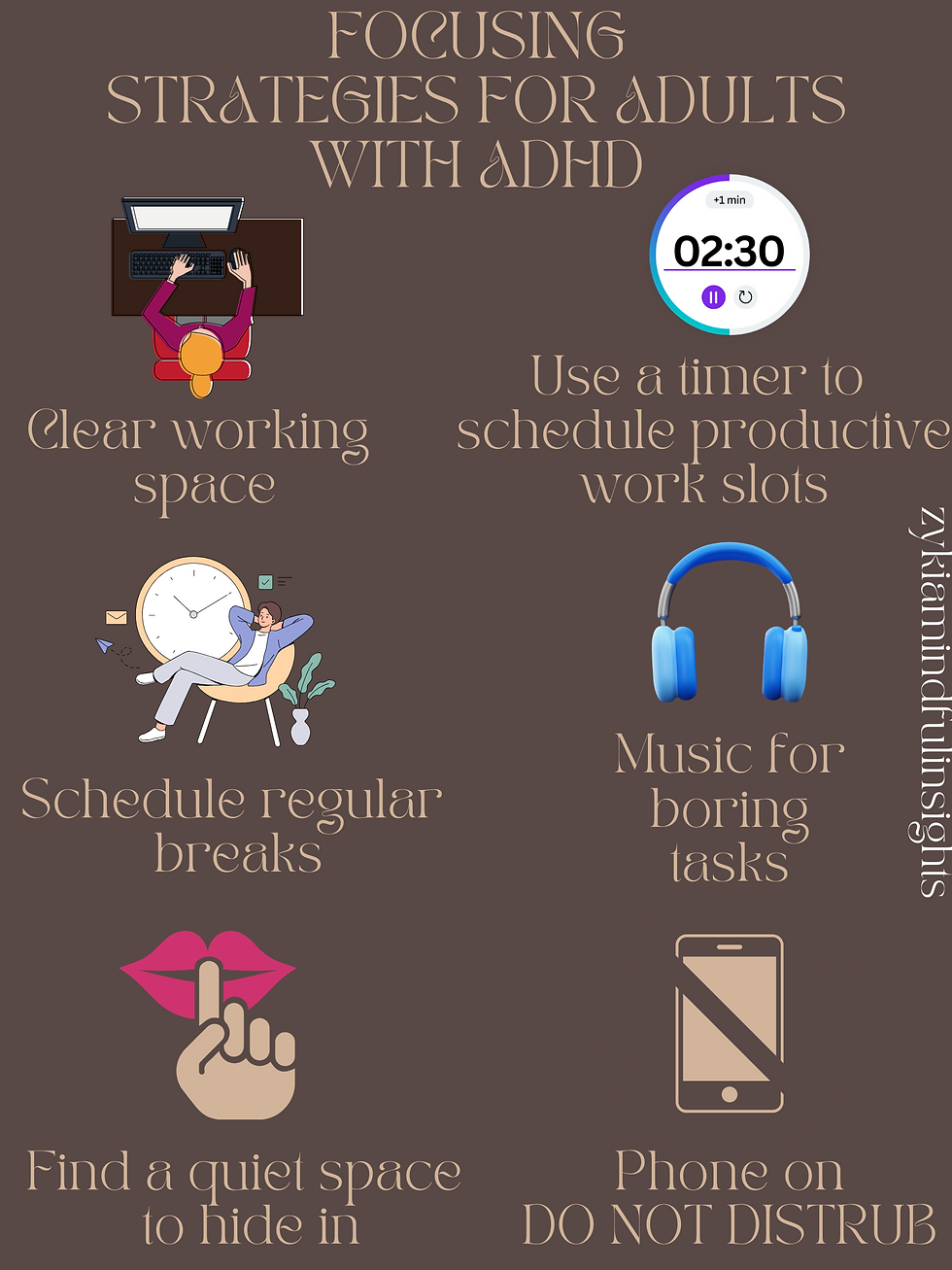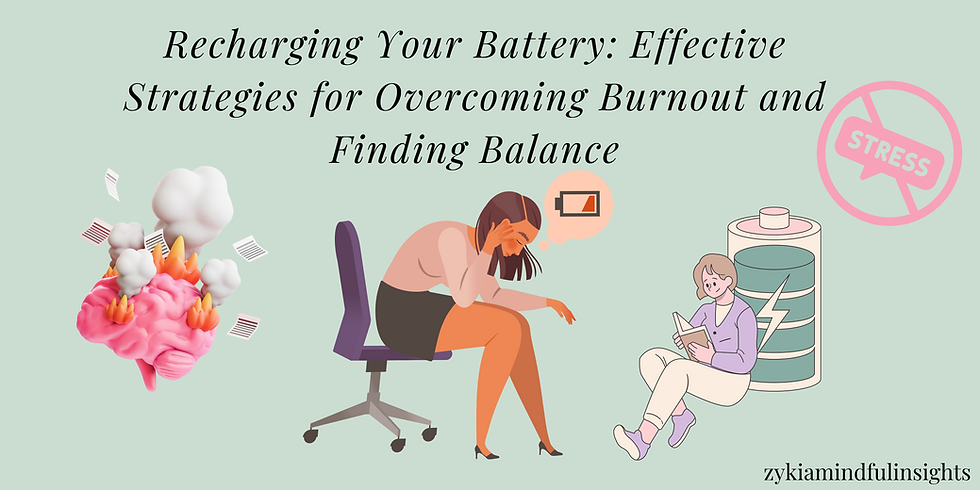How to effectively manage ADHD symptoms and improve focus: Practical strategies for success
- Zykia Hannah

- Mar 5, 2024
- 10 min read
Coping with Attention-Deficit/Hyperactivity Disorder (ADHD) often requires a comprehensive approach, encompassing a range of strategies to manage symptoms and improve focus. For many individuals, a combination of medication, therapy, and lifestyle adjustments can significantly enhance their daily functioning and quality of life. Through the understanding and application of these strategies, individuals with ADHD can develop effective coping mechanisms that empower them to navigate the challenges associated with the disorder and thrive in their personal and professional lives.

Coping with ADHD requires a multi-faceted approach. Here are some strategies for managing symptoms and improving focus:
Medication: For many, medication is an important part of managing ADHD. Stimulants like Adderall or Ritalin are commonly prescribed, but non-stimulant options are available as well.
Cognitive Behavioral Therapy (CBT): This type of therapy can help you identify and change negative patterns of thinking and behavior that may be causing problems.
Educate Yourself: Learn about ADHD, its symptoms, and how it affects you. Knowledge can empower you to better manage your symptoms and advocate for yourself.
Develop a Routine: Establishing a consistent daily routine can help you stay organized and on track.
Set Clear Goals: Breaking tasks into smaller, manageable steps can make them less overwhelming. Set realistic, achievable goals for yourself.
Use Tools and Technology: Utilize tools like planners, calendars, apps, and alarms to help you stay organized and manage your time effectively.
Exercise Regularly: Physical activity can help reduce ADHD symptoms. Find an exercise routine that you enjoy and can stick with.
Practice Mindfulness and Relaxation Techniques: Mindfulness exercises, deep breathing, and meditation can help improve focus and reduce stress.
Get Enough Sleep: Lack of sleep can exacerbate ADHD symptoms. Aim for 7-9 hours of quality sleep each night.
Eat a Healthy Diet: A balanced diet can support brain health and help manage ADHD symptoms.
Stay Connected: Surround yourself with supportive friends, family, and professionals who understand ADHD and can provide guidance and encouragement.
Consider Support Groups: Joining a support group can provide you with a sense of community and connection with others who are going through similar experiences.
Regular Check-Ins: Keep in touch with your healthcare provider to monitor your progress and make any necessary adjustments to your treatment plan.
Seek Accommodations if Necessary: If you're in school or at work, explore accommodations that can help you manage your ADHD symptoms and perform at your best.
Remember, everyone's experience with ADHD is unique, and what works for one person may not work for another. It may take time to find the right combination of strategies and treatments that work for you. Be patient with yourself and don't hesitate to seek professional help if you need it.
"ADHD can be challenging, but with the right strategies and support, individuals can learn to harness their unique strengths and thrive."
Medication and Therapy:
Many individuals with ADHD find that a combination of medication and therapy is highly effective in managing symptoms. Medications, like stimulants or non-stimulants, can help regulate attention and impulse control. However, medication alone may not address all aspects of ADHD. Cognitive-behavioral therapy (CBT) is often recommended to teach coping strategies, improve organizational skills, and change negative thought patterns. Working with a skilled therapist can help develop effective strategies tailored to your specific needs.
Routine and Structure:
Establishing a consistent daily routine can provide a sense of predictability and stability, which is particularly beneficial for individuals with ADHD. Breaking tasks into smaller, manageable steps can also make them less overwhelming. Set clear goals and prioritize tasks to stay organized. Use tools such as planners, calendars, and alarms to help structure your day. Consistency and structure can improve focus and productivity.
Physical Activity:
Regular exercise has been shown to have a positive impact on ADHD symptoms. Physical activity increases levels of dopamine and norepinephrine, neurotransmitters associated with attention and focus. Engaging in activities you enjoy, such as swimming, cycling, or yoga, can help reduce symptoms and improve overall well-being. Aim for at least 30 minutes of moderate-intensity exercise most days of the week.
Mindfulness and Relaxation Techniques:
Mindfulness practices, such as meditation and deep breathing exercises, can help improve focus and reduce impulsivity. Mindfulness teaches individuals to be present in the moment, reducing distractions and increasing attention to tasks. Relaxation techniques, such as progressive muscle relaxation and visualization, can also be effective in managing stress and promoting a sense of calm. Regular practice of these techniques can enhance emotional regulation and cognitive function.
Education and Support:
Educating yourself and seeking support from peers and professionals are crucial aspects of coping with ADHD. Understanding the nature of the disorder, its symptoms, and treatment options can help you make informed decisions about managing your condition. Support groups can provide a sense of community and a platform to share experiences, challenges, and successes. Working with a healthcare provider who specializes in ADHD can also offer valuable guidance and support tailored to your individual needs.

Adult ADHD self-help myths
Myth:
Having ADHD means I'm lazy or unintelligent, so I won't be able to help myself.
Fact:
The effects of ADHD may have caused you and others to label you this way, but the truth is that you are not unmotivated or unintelligent—you have a disorder that gets in the way of certain normal functions. In fact, adults with ADHD often have to find very smart ways to compensate for their disorder.
Myth:
ADHD is a life sentence—I'll always suffer from its symptoms.
Fact:
While it's true that there is no cure for ADHD, there is a lot you can do to reduce the problems it can cause. Once you become accustomed to using strategies to help yourself, you may find that managing your symptoms becomes second nature.
Myth:
A health professional can solve all my ADHD problems.
Fact:
Health professionals can help you manage symptoms of ADHD, but they can only do so much. You're the one living with the problems, so you're the one who can make the most difference in overcoming them.
Myth:
Medication is the only way to solve my ADHD.
Fact:
While medication can help some people manage the symptoms of ADHD, it is not a cure, nor is it the only solution. If taken at all, it should be used in conjunction with other treatments or self-help strategies.
Tips for getting organized and controlling clutter
The defining features of ADHD are attention deficits and distractibility, which pose a significant challenge for adults with the condition, especially in terms of staying organized. The thought of getting organized, whether it's in your workplace or your personal space, may seem daunting at first.
Nonetheless, there are strategies that can help. Breaking tasks into manageable steps and adopting a systematic approach to organization can make a world of difference. Utilizing tools like daily planners and setting up routines can establish a foundation for organization and minimize clutter. By taking small steps and incorporating these strategies into your daily life, you can develop a system that works for you and helps you stay on top of your tasks.
Develop structure and neat habits—and keep them up
When organizing your living or working space, the first step is to sort your belongings into categories, determining which are essential and which can be stored or discarded. For personal organization, adopt the practice of jotting down notes and creating lists. To maintain this new orderliness, establish daily routines.
Streamline your belongings. Assess your daily necessities and allocate storage space or closets for items you don't need on a regular basis. Designate specific spots for commonly misplaced items like keys and bills. Discard unnecessary items.
Utilize digital calendars and planners. The efficient use of a digital planner or calendar on your smartphone or computer can help you remember appointments and deadlines. Automated reminders can be set up to prevent you from missing scheduled events.
Harness the power of lists. Keep track of tasks, projects, deadlines, and appointments through lists and notes. If using a daily planner, store all your lists and notes in it. Alternatively, explore smartphone or computer apps tailored for this purpose.
Handle tasks immediately. Avoid forgetfulness, clutter, and procrastination by addressing tasks promptly. File papers, tidy up messes, or respond to calls immediately, rather than postponing them. If a task can be completed in under two minutes, do it straight away rather than delaying it.
Tips for managing money and bills
Effective money management is crucial, but it can be particularly challenging for adults with ADHD due to issues with planning and organization. Many conventional money management systems are not conducive to ADHD, often requiring excessive time, paper, and attention to detail. However, by crafting a personalized, streamlined system that is simple and consistent, you can gain control over your finances, mitigate overspending, and avoid penalties for missed deadlines or overdue bills.
Control your budget
To gain control of your budgeting, it's essential to start with an honest evaluation of your financial state. Begin by meticulously tracking all your expenses, no matter how minor, for a month. This thorough record will offer insight into your spending patterns. You may discover that you're spending more than anticipated on unnecessary items or impulse buys. With this knowledge in hand, you can then devise a monthly budget that aligns with your income and priorities.
To maintain adherence to your budget, consider strategies for avoiding deviations. For instance, if you notice excessive spending on dining out, you might commit to a meal-prep plan, setting aside time for grocery shopping and preparing meals at home.
Set up a simple money management and bill paying system
Establishing a simple, organized system for document and receipt management is crucial for effective bill management and expense tracking. For individuals with ADHD, leveraging online banking services can be particularly beneficial. Embracing digital financial management eliminates the need for manual paperwork, handwriting, and misplaced receipts.
Online banking provides a comprehensive view of your transactions and account balance in real-time, ensuring accurate financial oversight. You can also automate recurring payments, such as utility bills or subscriptions, and manually pay irregular expenses online. This streamlined approach minimizes the risk of misplaced payments or late fees, enhancing financial control.
Moreover, setting up bill payment reminders, either through the banking app or a calendar tool, can further optimize the process. Notifications via text or email serve as gentle prompts to stay on top of upcoming payments, preventing oversights and avoiding penalty charges.
Embracing technological advancements and utilizing free financial management tools can significantly simplify your financial management. While the initial setup may require some time, the seamless synchronization between accounts and the automatic updates will ultimately save time and reduce stress, facilitating a more organized and efficient financial life.
Put a stop to impulse shopping
The impulse shopping often associated with ADHD can have significant consequences, leading to financial strain and emotional distress. However, several practical measures can help mitigate impulsive purchases.
Opt for cash transactions and leave credit cards and checks at home. Having a set amount of cash ensures you stick to a predetermined budget and avoid exceeding your means.
Streamline your credit card usage by limiting it to a single card. This restricts the temptation to accumulate debt across multiple cards. When shopping, adhere strictly to your pre-prepared shopping list, preventing impulsive buys.
Leverage technology to assist with budget management by utilizing the calculator function on your mobile phone to track expenditures in real-time.
Reduce exposure to shopping triggers by avoiding stores where you're prone to overspend, discarding catalogs upon arrival, and blocking promotional emails from retailers. These strategies empower you to regain control over your finances and curb impulsive shopping tendencies.
Exercise and spend time outdoors
Working out is perhaps the most positive and efficient way to reduce hyperactivity and inattention from ADHD. Exercise can relieve stress, boost your mood, and calm your mind, helping work off the excess energy and aggression that can get in the way of relationships and feeling stable.
Exercise on a daily basis. Choose something vigorous and fun that you can stick with, like a team sport or working out with a friend.
Increase stress relief by exercising outdoors—people with ADHD often benefit from sunshine and green surroundings.
Try relaxing forms of exercise, such as mindful walking, yoga, or tai chi. In addition to relieving stress, they can teach you to better control your attention and impulses.
Get plenty of sleep
Sleep deprivation can exacerbate adult ADHD symptoms, hindering stress management and focus maintenance. Modifying daytime habits can significantly improve sleep quality.
Refrain from consuming caffeine in the late afternoon or evening, as it can interfere with sleep onset.
Maintain a consistent exercise routine, ensuring vigorous activity is completed at least an hour before bedtime. Exercise promotes restful sleep but should be timed appropriately to avoid stimulating effects.
Establish a calming pre-bed routine, incorporating activities like a warm shower or bath to promote relaxation.
Adhere to a regular sleep-wake schedule, maintaining consistent bedtimes and wake times throughout the week, including weekends. This practice reinforces your body's internal clock, aiding in the establishment of healthy sleep patterns.
Eat healthfully
Although ADHD is not caused by unhealthy eating habits, poor dietary choices can amplify symptoms. Implementing straightforward modifications in eating habits can lead to significant improvements in focus, hyperactivity, and stress levels.
Consume smaller, more frequent meals throughout the day to sustain energy levels and alleviate spikes in hunger and blood sugar levels.
Limit intake of sugar and junk food, which
can exacerbate ADHD symptoms. Opt for whole, unprocessed foods whenever possible.
Ensure each meal incorporates a healthy protein source, as protein is essential for neurotransmitter function and mood regulation.
Prioritize whole grains rich in fiber, which promote stable energy levels and contribute to overall health and well-being. Incorporating these dietary changes can contribute to better symptom management and overall well-being.
Practice mindfulness
In addition to stress reduction, consistent mindfulness meditation has the potential to enhance your ability to resist distractions, reduce impulsivity, sharpen your focus, and enhance emotional regulation. While hyperactivity symptoms may initially present challenges for some adults with ADHD, a gradual approach can ease the transition. Begin with brief meditation sessions and gradually extend them as you become more adept at maintaining focus. Importantly, incorporate these mindfulness techniques into your daily routine to promote sustained focus. Experiment with accessible resources like free or affordable smartphone apps and online guided meditations to find what works best for you.
Navigating life with ADHD requires patience, understanding, and an array of strategies tailored to individual needs. Effective coping mechanisms often involve a combination of medication, therapy, and lifestyle adjustments, including developing a structured routine, engaging in regular exercise, and practicing mindfulness. Additionally, learning to manage finances, organizing tasks and paperwork, and prioritizing self-care are crucial aspects of managing ADHD. Remember, it's essential to educate oneself about ADHD, seek support from peers and professionals, and stay committed to a personalized approach to self-improvement. By implementing these strategies and fostering a supportive environment, individuals with ADHD can develop a sense of control, resilience, and well-being, ultimately thriving in their personal and professional lives.
🤍Quote of the day:
“Attitude is a choice. Happiness is a choice. Optimism is a choice. Kindness is a choice. Giving is a choice. Respect is a choice. Whatever choice you make makes you. Choose wisely.” ― Roy T. Bennett, The Light in the Heart




Comments